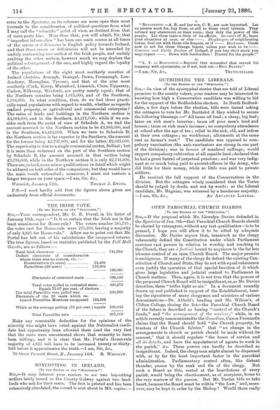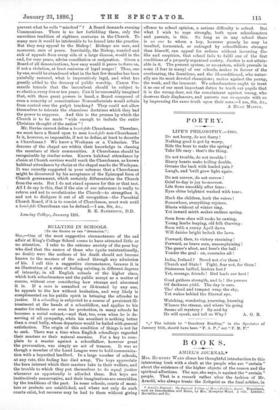OPEN PAROCHIAL CHURCH BOARDS
To THE EDITOR OF THE " SPECTATOR." I SIR,-If the proposal which Mr. Llewelyn Davies defended in the Spectator of Jan. 9th—that Parochial Church Boards should be elected by ratepayers, without any test qualification—is to be pressed, I hope you will allow it to be sifted by adequate discussion. Mr. Davies argues that, inasmuch as the clergy vehemently defend the Constitution under which Parliament exercises vast powers in relation to worship and teaching in the Church, they are a fortiori bound to acquiesce in the far less irksome control of an open Church Board. The major premiss is ambiguous. If many of the clergy do defend the existing Con- stitution of Church and State, they do not with equal vehemence even justify the operation of that special function of it which gives large legislative and judicial control to Parliament in Church matters. Then, again, it is not true that the powers of the proposed Church Board will be insignificant, or, as Mr. Davies describes, them " trifles light as air." In a document recently drawn up and published in support of the Establishment, bear- ing the signatures of many clergymen and ministers of various denominations—Dr. Abbott's heading and Mr. Wilson's, of Clifton College, closing the list—the Parochial Church Board of the future is described as having "control of the Church's funds," and "the arrangement of the services ;" while, in an article recently communicated to the Guardian, Canon Fremantle claims that the Board should hold " the Church property, be• trustees of the Church fabrics," that "no change in the arrangements in church or parish should be made without its consent," that it should regulate "the hours of service and all its details, and have the appointment of agents to work in• the parish," &c. These powers can hardly be described as insignificant. Indeed, the clergyman might almost be dispensed with, as by far the least important factor in the parochial administration. Parliamentary control often, like distant thunder, passes by the rank and file of the clergy. But such a Board as this, seated at the hearthstone of every parish, would bring the chastisement, as of scorpions, home to the very marrow of the parson. But Mr. Davies bids us take heart, because the Board must be within " the Law," and, more- over, may be kept in order by the Bishop ! _Would these really prevent what he calls "mischief " P A Board demands evening Communions. There is no law forbidding them, only the unwritten tradition of eighteen centuries in the Church. To many men it would be intolerable to be forced into the practice. But they may appeal to the Bishop ! Bishops are men, and moreover, men of peace. Inevitably, the Bishop, wearied and sick of appeals from every side of a large diocese, would in the end, for very peace, advise conciliation or resignation. Given a Board of all denominations, how easy would it prove to force on, if not a violation, at least omission of legal usages ! Thus, one by one, would be abandoned what in the last few decades has been painfully restored, what is imperatively legal, and what has greatly added to the decency of public worship. Canon Fre- mantle intends that the incumbent should be subject to re-election every five or ten years. Can it be reasonably imagined that, with these great powers in hand, a Board composed of even a minority of conscientious Nonconformists would refrain from control over the pulpit teaching ? They could not allow themselves to tolerate the obnoxious doctrines which they had the power to suppress. And this is the process by which the Church is to be made " wide enough to include the entire Christian thought of the nation " !
Mr. Davies cannot define a bontl-fide Churchman. Therefore, we must have a Board open to men bonit-fide non-Churchmen ! Is it, however, so impossible, if not to define, at least to describe a Churchman P We know a Wesleyan or a Unitarian. The deacons of the chapel are within their knowledge in classing the members of their communities. A Churchman should be recognisable by similar notes. Known habitual attendance by -choice at Church services would mark the Churchman, as known habitual attendance by choice at the chapel marks the Wesleyan. It was recently suggested in your columns that a Churchman might be discovered by his acceptance of the Episcopal form of -Church government, which certainly differentiates the Church from the sects. But I do not stand sponsor for this or that test. All I do say is this, that if the aim of our reformers is really to reform and not to revolutionise the Church—to strengthen it, and not to disfigure it oat of all recognition—the Parochial Church Board, if it is to consist of Churchmen, must wait until a boncl-fule Churchman can be defined.—I am, Sir, &c.,



































 Previous page
Previous page